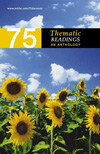
Jonathan Swift |  |
Jonathan SwiftJonathan Swift, "A Modest Proposal" Jonathan Swift (1667-1745) was born in Dublin, Ireland, graduated from
Trinity College there in 1686, earned an M.A. from Oxford University in
1692, and a D.D. from Dublin University in 1701. He was a secretary to
Sir William Temple (an English diplomat), an Anglican priest, and a dean
of St. Patrick's Cathedral in Dublin. Now known throughout the world for
his timeless satire, Swift was an accomplished poet, a notorious pamphleteer,
and a brilliant novelist. His best-known works include The Battle of
the Books/A Tale of a Tub (1704), his masterpiece Gulliver's Travels
(1726), and TheGrand Question Debated (1729). Swift died
in Dublin after battling brain disease and later suffering a stroke. "A
Modest Proposal," which suggests a simple solution to a serious problem
Ireland faced in the 18th century, was first published in 1729.
| QUESTIONS FOR DISCUSSION | CONTENT - What are the mothers and children in the first paragraph doing?
- About how many people were living in Ireland at the time of this
writing? What does Swift do with this number?
- What does the author mean when he refers to Papists? In
what context does he mention them?
- Why does Swift write that the food he mentions is especially "proper
for landlords"?
- How does Swift suggest that his plan might be modified?
- How does the author suggest that the "aged, diseased, or maimed"
be treated?
- What is the "one objection" Swift admits might arise
to his plan? How does he deal with it?
STRATEGY AND STYLE - What did you do about the words in this piece that you didn't know,
or couldn't determine a definition for from the context? (If, upon first
reading, you knew the meaning of the words dam and dainty
as used here, as well as gibbet, vintners, and raiment,
you can skip this exercise.) Review the reading and look up everything
you didn't understand. Will you do this in the future?
- What is Swift's argument? What is the nature of his support for
his main points?
- Where exactly is it clear in the essay that we are not to take
Swift at his literal word? What effect does this delay have upon the
impact of his revelation? What would he lose if he moved it up to the
beginning?
- Discuss the title of this essay. How effective is it given the
reading's subject matter and tone? What do you make of the word modest?
- What's the difference between irony and sarcasm? Does Swift use
more irony or sarcasm in "A Modest Proposal"? Explain, using
specifics from your reading.
| ENGAGING THE TEXT | - Did you find this essay funny? If you did, what did you
find funny? If you didn't think it was funny, why not?
- Do you think that there are some topics that just aren't suitable
for comedy? Explain. How can you relate these feelings to your reading
here?
| SUGGESTIONS FOR SUSTAINED WRITING | - Satire has a moral underpinning, as it pokes fun at serious things,
especially human beings behaving badly. Take these elements of satire
and apply them to "A Modest Proposal" in an essay that examines
it as a satirical work.
- Come up with a contemporary topic that interests you and that involves
people behaving badly—CEOs acting greedily, consumers squandering nonrenewable
resources, drivers making left turns without signaling. Or, come up
with a topic of your own. Write a satirical essay that proposes a solution
to your problem.
| FOR FURTHER RESEARCH | Do some research to find out how Swift's "A Modest Proposal"
was received upon its initial publication. Were people amused, confused,
outraged, baffled? Was it ignored? How did Swift react? If you can't come
up with specifics about the last question, speculate based upon what you
know about the author. | WEB CONNECTION | Interested in putting Swift into a historical context? This
is what Samuel Johnson wrote about him, and should help you on your way. | LINKS | Biographical This is a good start
page from Brittanica.com. There, you'll find a portrait, some biographical
information, and links. Want to do some more Web surfing for information about this author?
Here is a good collection of Swift links. An interesting way to see the scope of Swift's work is to browse through
the list of his citations at the Library
of Congress. What did you find there that you didn't know before
your visit?
Bibliographical Here is "A
Modest Proposal" in etext. Do you like reading electronic texts?
What are the drawbacks of etexts? What can you do with an etext that's
harder to do when using plain old paper? What advantages does print
have? Here's Gulliver's
Travels in several different etext formats. How reliable do
you consider these versions of the text? How can one determine the reliability
of texts found on the Internet? Still hungry for more works by this author? Here is Swift's Battle
of the Books and Other Short Pieces in e-text.
Cultural Did you know that Swift also wrote poetry? Here is a page
with links to some of Swift's poems. Pick a poem and study it. How can
you link the poem to Swift's prose style? How is the poem different? Interested in some more background about the gruesome subject material
in this piece? Here's an essay
about cannibalism. What is the tone of this essay? How can you tell?
How can you link it to "A Modest Proposal"? Jonathan Swift is best known for his satirical
works. Interested in taking a look at some contemporary satire? This
is the homepage of a satirical
website, The Onion. Check it out.
|
|
|
|